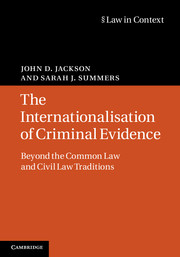Book contents
- Frontmatter
- Contents
- Foreword
- Preface and acknowledgements
- Abbreviations
- Table of international cases
- Part I Evidentiary contexts
- Part II Evidentiary rights
- 6 Fair trials and the use of improperly obtained evidence
- 7 The presumption of innocence
- 8 Silence and the privilege against self-incrimination
- 9 Defence participation
- 10 Challenging witness evidence
- 11 Towards a theory of evidentiary defence rights
- Index
- References
8 - Silence and the privilege against self-incrimination
Published online by Cambridge University Press: 05 June 2012
- Frontmatter
- Contents
- Foreword
- Preface and acknowledgements
- Abbreviations
- Table of international cases
- Part I Evidentiary contexts
- Part II Evidentiary rights
- 6 Fair trials and the use of improperly obtained evidence
- 7 The presumption of innocence
- 8 Silence and the privilege against self-incrimination
- 9 Defence participation
- 10 Challenging witness evidence
- 11 Towards a theory of evidentiary defence rights
- Index
- References
Summary
The historical and transnational importance of the right of silence
In Chapter 4 we noted that one of the strands developed by the European Court of Human Rights in its vision of defence participation is the right to choose not to participate in the proof process. In this chapter, we explore this principle which the court has referred to as ‘the right to remain silent and not to contribute to incriminating oneself’. The principle is commonly believed to have its origins in the common law and is generally traced back to 1641 when the Star Chamber and the High Commission were abolished in England along with the ex officio oath procedure under which accused persons were required to take an oath to answer all questions. The precise origins of the privilege remains obscure, with some tracing it back to ancient Christian writings and to Talmudic law. The maxim ‘nemo teneter prodere se ipsum’, which served as a guarantee that no one would be required to become the source of their own prosecution, has been traced back to medieval canon law and the European ius commune.
The growing consensus that the privilege has a broader and older ancestry than the English common law may explain why it has gained acceptance not only in the English speaking world, but around the globe, as well as in various human rights instruments. Although the privilege was not part of the charters that established the Nuremberg or the Tokyo tribunals, it is expressly recognised, as we shall see, in the ICCPR and the ACHR. It has been estimated that no less than forty-eight national constitutions provide for a privilege against self-incrimination, although over half of these instruments expressly limit it to testimony at trial, many in former British colonies with common law roots. Although the right is not expressly mentioned in the ECHR, the ECtHR has described the privilege and the right of silence as ‘generally recognised international standards which lie at the heart of the notion of a fair trial procedure’.
- Type
- Chapter
- Information
- The Internationalisation of Criminal EvidenceBeyond the Common Law and Civil Law Traditions, pp. 241 - 284Publisher: Cambridge University PressPrint publication year: 2012

